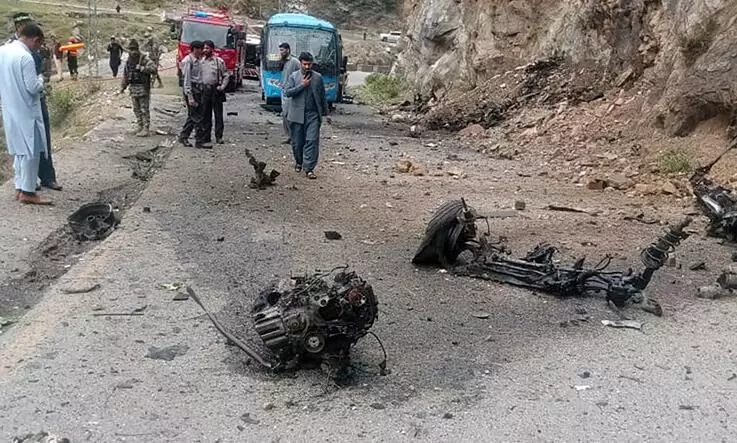In the crosshairs
The killing of Chinese nationals in a terror attack in Bisham has put considerable strain on China-Pakistan ties — necessitating enhanced security and decisive actions against terrorism

In an unusual occurrence, the Bisham attack specifically targeted Chinese nationals
Pakistan has been hit hard once again by a series of lethal terror attacks over the past two days, particularly in Bisham (Khyber Pakhtunkhwa) on March 26. Pakistan now appears to be in the midst of a resurgence of terrorist violence that refuses to die down. More disturbing is the fact that these terror crimes are recurring with alarming frequency and ferocity. Significantly, while most victims so far have been civil and military security personnel, the Bisham assault specifically targeted Chinese nationals, and according to reliable sources, at least six people, including five Chinese, were killed in a suicide bombing carried out by the terrorists. The Chinese nationals were en route to the Dasu Hydropower Project from Islamabad when an explosives-laden car collided with their vehicle.
In the meantime, more disturbingly, in Turbat, Baloch separatist militants attacked the PNS Siddique Naval Base on the night of March 25, killing one security personnel. Earlier, last week, the security forces had claimed to have foiled a terrorist attack, also believed to have been carried out by the Baloch separatists, on the strategic Gwadar Port Authority Complex. While no group has claimed responsibility for the Bisham bombing, there have been instances where Baloch separatist elements targeted Chinese facilities in Pakistan. Interestingly, harping on the same old tune, the Army has claimed to have identified “certain foreign elements” as being responsible for the latest trend of terrorism. The Foreign Office (FO) has also stated that “enemies of Pakistan-China friendship” are behind these patterns of terror violence. Similarly, a section of the media suggests that both the Bisham and Gwadar terror attacks seem to be aimed at derailing the Pakistan-China relationship, especially the economic aspect, in an apparent bid to impair the China-Pakistan Economic Corridor (CPEC) and Belt and Road Initiative (BRI). It may be recalled that in the past, there were instances of Chinese casualties, such as the 2021 attacks in Kohistan near Bisham, and the 2022 attack on Karachi University’s Confucius Institute. Blaming others for the terror attacks means that Pakistan’s internal security and intelligence architecture are out of efficiency, resulting in such repeated incidents of terror. To hide their own weaknesses, the country is shifting the blame to others. This is loud and clear.
Reacting to the latest incident, Beijing's response has been firm, with the Chinese embassy demanding that Pakistan take "practical and effective measures" to protect its nationals. China also mentioned that it has supported this country during difficult times and invested in Pakistan when few others were willing. Moreover, at a time when Pakistan is trying to woo foreign investors to bring their dollars here in order to infuse some life into a failing economy, the country cannot afford terrorists attacking foreign workers. Security must be immediately enhanced for all foreigners working in the country, especially Chinese nationals. The civilian and military leadership must work closely to dismantle the terrorist infrastructure without delay. If malign foreign actors are involved in subterfuge, diplomatic channels should be used to communicate that their facilitation of terrorist violence will be exposed to the international community. For the government, the bonhomie is over, and the time has come for a decisive action against such spate of terror violence. Above statements are widely articulated in a large section of the media.
Meanwhile, President Asif Ali Zardari condemned the attack on Chinese nationals, stating that anti-Pakistan elements will never succeed in harming the Pakistan-China friendship. He noted that this was not just an attack on Chinese citizens but also on Pakistan. Prime Minister Shehbaz Sharif, who assumed power for the second time earlier this month, was expected to visit China next month. He, however, visited the Chinese embassy in Islamabad, offering condolences to the bereaved Chinese families.
On its part, strongly condemning the suicide attack on the Dasu Hydropower Project staff, China, on March 26, urged Pakistan to severely punish perpetrators of the terrorist attack. The Chinese embassy, in the meantime, has launched an exigency plan immediately, requesting the Pakistani side to thoroughly investigate the attack and severely punish the perpetrators. In addition to this, the embassy reminded Chinese citizens and enterprises in Pakistan to pay close attention to the security situation, enhance security alerts, strengthen security measures, and make every effort to take safety precautions.
It would appear from these developments that the Pakistan security establishment is surely rattled by these renewed dastardly terror attacks which will take some time to steady the stormy ties between China and Pakistan.
The writer is a retired IPS officer, Adviser NatStrat, and a former National Security Advisor in Mauritius. Views expressed are personal




